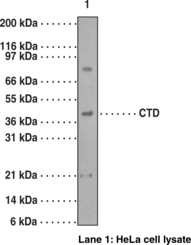Territorial Availability: Available through Bertin Technologies only in France
- Correlated keywords
- caspases nine 9 apaf-1 apaf1 apaf 1 one binds binding activation activates active cleaves proteases proteolytic cleavage apoptosis inducers TNFa TNF-a TNF a TNF? TNF-? ? TNFalpha TNF-alpha alpha TNF.alpha. TNF-.alpha. .alpha. TRAIL CD-95 CD95 CDs 95 FADD TRADD tissues C-terminal C-terminus terminal terminus C proteins peptides Casp-9 Casp9 Casp genes cytoplasm nucleus cytochrome c dominant-negative western blots blotting immunoblotting WB
- Product Overview:
Caspase-9 and Apaf-1 bind to each other, which leads to caspase activation. Activated caspase-9 cleaves and activates caspase-3, one of the key proteases responsible for the proteolytic cleavage of many proteins in apoptosis. Caspase-9 plays a central role in cell death induced by a wide variety of apoptosis inducers including TNFa, TRAIL, anti-CD95, FADD, and TRADD. Caspase-9 is expressed in a variety of human tissues. Recently, a novel isoform of rat caspase-9 has been identified in which the C-terminus of full-length caspase-9 is replaced with an alternative peptide sequence. This protein, called Caspase-9 (CTD) (where CTD is carboxyl-terminal divergent) is expressed in multiple tissues, with the relative highest levels observed in ovary and heart. The variant C-terminus of CTD in rat is derived from an alternative exon of the rat caspase-9 gene. CTD was found primarily in the cytoplasm and was not detected in the nucleus. CTD proenzyme is not processed in the cells and lacks apoptotic activity. The CTD-transfected cells are resistant to caspase induction by cytochrome c, suggesting the CTD acts as a dominant-negative variant.
Cayman Chemical’s mission is to help make research possible by supplying scientists worldwide with the basic research tools necessary for advancing human and animal health. Our utmost commitment to healthcare researchers is to offer the highest quality products with an affordable pricing policy.
Our scientists are experts in the synthesis, purification, and characterization of biochemicals ranging from small drug-like heterocycles to complex biolipids, fatty acids, and many others. We are also highly skilled in all aspects of assay and antibody development, protein expression, crystallization, and structure determination.
Over the past thirty years, Cayman developed a deep knowledge base in lipid biochemistry, including research involving the arachidonic acid cascade, inositol phosphates, and cannabinoids. This knowledge enabled the production of reagents of exceptional quality for cancer, oxidative injury, epigenetics, neuroscience, inflammation, metabolism, and many additional lines of research.
Our organic and analytical chemists specialize in the rapid development of manufacturing processes and analytical methods to carry out clinical and commercial GMP-API production. Pre-clinical drug discovery efforts are currently underway in the areas of bone restoration and repair, muscular dystrophy, oncology, and inflammation. A separate group of Ph.D.-level scientists are dedicated to offering Hit-to-Lead Discovery and Profiling Services for epigenetic targets. Our knowledgeable chemists can be contracted to perform complete sample analysis for analytes measured by the majority of our assays. We also offer a wide range of analytical services using LC-MS/MS, HPLC, GC, and many other techniques.
Accreditations
ISO/IEC 17025:2005
ISO Guide 34:2009
Cayman is a leader in the field of emerging drugs of abuse, providing high-purity Schedule I-V Controlled Substances to federally-licensed laboratories and qualified academic research institutions for forensic analyses. We are certified by ACLASS Accreditation Services with dual accreditation to ISO/IEC 17025:2005 and ISO Guide 34:2009.





